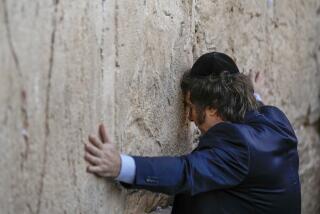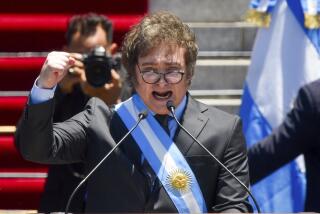Possibility of Army Coup Worries Argentines on Eve of Vote
- Share via
BUENOS AIRES — Developments in Panama, racked by political turmoil since last Sunday’s election, struck a sympathetic chord Friday in Argentina.
There is to be a presidential election in this country Sunday, and a public opinion poll showed that the No. 1 concern of young Argentines is fear of a military coup.
Much of this concern is focused on an Argentine army officer, Col. Mohamed Ali Seineldin, who slipped back into Argentina in December, 1988, after serving as a military adviser in Panama. There, he had been decorated by Gen. Manuel A. Noriega, the Panamanian strongman, for his help in training the so-called Dignity Battalions that have been accused of assaulting Noriega’s political opponents.
Charged But Not Tried
Before the end of December, Seineldin led an abortive military uprising against the Argentine government, the third in the past two years. He was arrested, but he has yet to go on trial, and his followers are still active.
Concern about the election, and about whether the military will allow the democratic process to go forward unhindered, would seem to be justified. Not since 1928 has Argentina had a genuine transition from one freely elected president to another, and after six coups against elected governments, all sides regard Sunday as a critical step in the consolidation of democracy.
Since a left-wing attack on an army base in January, the military has reasserted itself as an influential political player and largely erased its disgrace of defeat by Britain in the Falkland Islands War in 1982. Also, an unprecedented economic crisis has helped to soften memories of the harsh military governments that ruled Argentina from 1976 to 1983.
However, the military is bitterly divided between younger, pro-Peronist elements loyal to Seineldin and the senior officer corps, including anti-Peronists and those who want an apolitical military. The Peronists take their name from Gen. Juan D. Peron, who ruled Argentina in 1946-55 and again in 1973-74 until his death in July, 1974.
In light of the officer corps’ newly confident attitude, the Argentine people are watching closely how the armed forces react to Sunday’s vote.
Seineldin has proclaimed his support for the Peronist candidate for president, Carlos Saul Menem, who is regarded as the front-runner. Menem has called Seineldin a “brilliant officer” although he condemned Seineldin’s uprising as a challenge to democracy.
Whatever their political affinities, the armed forces are united on one issue: They want an end to the trials of officers accused of human rights abuses in the 1976-83 “dirty war” against left-wing subversion. They also want an end to the general denigration of the military by politicians.
President Raul Alfonsin came into office vowing to bring to trial the officers responsible for the disappearance of at least 9,000 people under military governments. Five former members of governing military juntas were sentenced to prison, and charges were filed against hundreds of other officers.
The military was angry but impotent as Alfonsin reduced the military budget, cut troop strength in half and won approval of a law banning the military from domestic intelligence activities.
Lt. Col. Aldo Rico, a nationalist and a Falklands veteran, led the first two uprisings, in April, 1987, and January, 1988. He said he wanted to restore the dignity of the armed forces. Seineldin professed a similar goal in December.
Both officers said they had no plan to bring down the government. Yet, the first two revolts forced Alfonsin to curtail a number of pending trials, and the third led to a deal that included the retirement of the army commander, Gen. Dante Caridi, an Alfonsin loyalist.
In all three incidents, there was serious doubt that military personnel would have obeyed any order to fire on the rebels.
Then, in January, left-wing guerrillas attacked the garrison at La Tablada, saying that a coup was being plotted there. Thirty-nine people were killed in this first outburst of left-wing violence since democratic rule was restored in 1983.
Soon afterward, Alfonsin issued a decree giving the army authority to engage in domestic intelligence activities against possible subversion. He also created a new National Security Council, including the military chiefs of staff, to advise him. Prosecutors asked for sentences of life imprisonment for the captured guerrillas.
Rico and Seineldin, the rebel officers, are both in detention, and neither has been brought to trial. All human rights cases have been “deferred” until after the election, and few people expect any action soon. Seineldin’s followers say they have the support of most of younger officers.
The pro-Seineldin forces call themselves nationalists. They applaud Menem’s pro-Argentina patriotism and his call for a law of “pacification,” a euphemism widely interpreted as meaning amnesty for human rights abusers.
Although Menem spent five years under arrest during the 1976-83 military regime, he is generally seen to have better relations with the officer corps than Alfonsin and the ruling party, the Radical Civic Union.
Menem’s military advisers include Roberto Dromi, mayor of Mendoza under the military regime, and Simon Arguello, who has ties to Seineldin.
Denies Knowing Seineldin
Menem denies knowing or supporting Seineldin. However, a Seineldin supporter, lawyer Radames Roberto Marini, says Menem’s wife, Zulema, has met the officer in the three-room office where he is detained.
“There is quite a fluid communication between Seineldin and (Menem’s) intermediaries,” Marini said. “Menem needs to have this situation resolved so that the military functions.”
The Peronist party itself was the offspring of a military coup, in 1943, when Gen. Peron maneuvered himself into power and then won the 1946 election. Peronism has caused deep divisions in the armed forces ever since.
Peron was toppled by disaffected officers in 1955, and successive military and civilian governments banned or repressed his Justicialist Party, as Peronism is formally known.
Peron’s third wife and vice president, Maria Estela Peron, was overthrown in a coup in 1976 after Peron’s death in office during his brief second reign, at a time of left-wing guerrilla violence and economic chaos.
More to Read
Sign up for Essential California
The most important California stories and recommendations in your inbox every morning.
You may occasionally receive promotional content from the Los Angeles Times.












